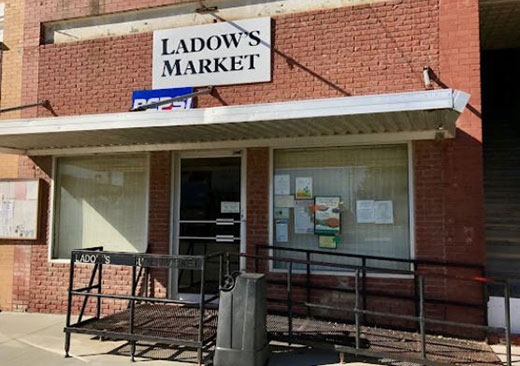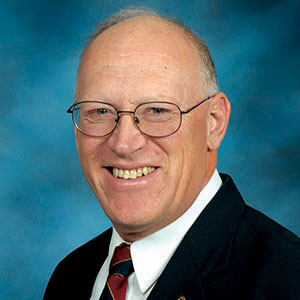
Ladow's Market, Lebanon (Kan.) | Download this picture
Kansas Profile – Now That’s Rural: Kaden and Emily Roush, LaDow’s Market
Sept. 14, 2022
By Ron Wilson, director of the Huck Boyd National Institute for Rural Development at Kansas State University
Today let’s go to the center of the country to visit an innovative family which has centered its business on high quality, locally produced fresh food, including their own specialty pork.
Last week we met Kaden and Emily Roush, the owners of R Family Farms near Lebanon -- the geographic center of the contiguous United States. The Roushes operate a niche hog production system involving Berkshire pigs. What is the history of Berkshire hogs?
According to legend, 300 years ago Oliver Cromwell’s army was encamped in winter quarters at Reading, the county seat of the shire of Berks in England. They discovered the hogs there to be larger than any swine of the time and to produce ham and bacon of remarkable quality. That was the beginning of the Berkshire breed.
For years, the royal family kept a large herd of Berkshires at Windsor Castle due to the excellent carcass quality of the hogs. In 1823, the first Berkshires were imported to the U.S. In 1875 the American Berkshire Association was created, becoming the first swine registry to be established in the world.
In modern times, Kaden took note of the carcass quality of these hogs. For example, in a summary of tests conducted over a 20-year span at the National Barrow Show in Austin, Minnesota, Berkshire pigs scored highest of all major American pure breeds in sensory quality.
R Family Farms began raising Berkshire hogs. The business now specializes in private label production and direct online marketing of their Berkshire pork. R Family Farms is a member of the From the Land of Kansas program of the Kansas Department of Agriculture.
During the pandemic, the Roushes were handling more than 1,000 orders per year out of their garage. They were looking for a retail outlet when something happened in their hometown.
A grocery store had been operated in Lebanon for many, many years. In the 1970s, it was purchased by the LaDow family and operated as LaDow’s Market for decades.
As the LaDows were getting older, some people wondered what would happen to the store when the LaDows retired. Then the husband passed away. It appeared the store would close.
“We wanted to keep a store in our community and we were looking for a retail storefront,” Kaden Roush said. In February 2022, they purchased the store, which continues to operate as LaDow’s Market.
With help from K-State’s Rural Grocery Initiative, R Family Farms applied for a grant from the Healthy Food Financing Initiative. The HFFI was authorized by the 2014 farm bill. Its’ mission is to improve access to healthy foods in underserved areas, create and preserve quality jobs and revitalize low income communities.
The program is administered by the Reinvestment Fund on behalf of USDA Rural Development. HFFI provides capacity building and financial resources to eligible healthy food retail projects in underserved areas.
In June 2022, USDA announced the current HFFI grants, including three in Kansas. All three of these received help in developing grant proposals from the Rural Grocery Initiative. The grants went to the Groundwork Northeast Revitalization Group, a neighborhood coalition in Kansas City, Kansas; the Marmaton Market (as we have previously profiled) and R Family Farms.
The R Family Farms grant will help support the overall construction and costs of rehabilitating the LaDow’s Market historic building into a retail space, adding both refrigerated and dry warehousing capacity. This will accommodate R Family Farms’ growing local meat business as well as creating a permanent aggregation location for other food producers.
As the LaDow’s Market logo states: “The freshest groceries come from the Center.”
For more information on the store, search for LaDow’s Market.on Facebook. For more information on the rural grocery initiative, see www.ruralgrocery.org.
It’s time to leave this center of creative pork marketing in the center of the contiguous United States. We commend Kaden and Emily Roush of R Family Farms and LaDow’s Market for making a difference with innovative pork production.
Their commitment to quality for their customers is front and center.
Audio and text files of Kansas Profiles are available at http://www.kansasprofile.com. For more information about the Huck Boyd Institute, interested persons can visit http://www.huckboydinstitute.org.
***
The mission of the Huck Boyd National Institute for Rural Development is to enhance rural development by helping rural people help themselves. The Kansas Profile radio series and columns are produced with assistance from the K-State Research and Extension Department of Communications News Media Services unit. A photo of Ron Wilson is available at http://www.ksre.ksu.edu/news/sty/RonWilson.htm. Audio and text files of Kansas Profiles are available at http://www.kansasprofile.com. For more information about the Huck Boyd Institute, interested persons can visit http://www.huckboydinstitute.org.


